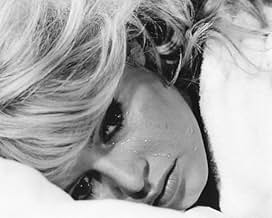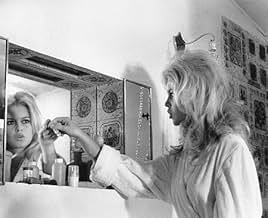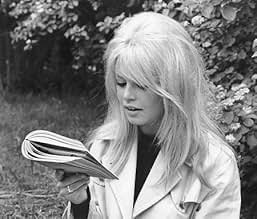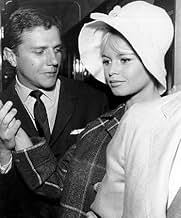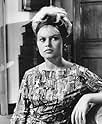Vie privée
- 1962
- 1 घं 43 मि
IMDb रेटिंग
5.6/10
1.3 हज़ार
आपकी रेटिंग
अपनी भाषा में प्लॉट जोड़ेंWhen Jill becomes a movie star she soon discovers that her private life is destroyed by persistent fans that won't leave her alone. Her mother's ex-lover, Fabio, tries to protect her.When Jill becomes a movie star she soon discovers that her private life is destroyed by persistent fans that won't leave her alone. Her mother's ex-lover, Fabio, tries to protect her.When Jill becomes a movie star she soon discovers that her private life is destroyed by persistent fans that won't leave her alone. Her mother's ex-lover, Fabio, tries to protect her.
- निर्देशक
- लेखक
- स्टार
Paul Sorèze
- Maxime
- (as Paul Soreze)
Eléonore Hirt
- Cécile
- (as Eleonore Hirt)
Jeanne Allard
- La femme de ménage
- (बिना क्रेडिट के)
Paul Apoteker
- Le caméraman
- (बिना क्रेडिट के)
Jean-Claude Brialy
- Le narrateur
- (वॉइस)
- (बिना क्रेडिट के)
Claude Day
- L'éditeur
- (बिना क्रेडिट के)
Christian de Tillière
- Albert
- (बिना क्रेडिट के)
फ़ीचर्ड समीक्षाएं
Reviewers have suggested that this is not among the best of Malle's output and that the two principals lack the fire of real heterosexual passion.
The second objection is perfectly right, because Jill seems incapable of a grown-up relationship with a man, just as she seems incapable of pursuing any worthwhile career beyond that of international sex-symbol. Being highly desirable and readily available may be huge fun in your teens and early twenties but does not lead to a fulfilling existence. Her trajectory is tragic, beauty that offers not life but a hollow illusion of life.
While Fabio cannot resist what he finds in his bed (few straight men could), his feelings for Jill seem more pity than lust. He wants to protect her from endless exploitation by others and from her own immaturity. But, having gained an international reputation for the magazine he edits and the play he is producing, he is not going to sacrifice his hard-won status for a bimbo. He is creative, adding to the world's culture, while she is merely decorative.
A relationship between two characters like this will be short of fire, and it would be Hollywoodian falsity to pretend that they are merely consumed with passion for each other.
As for the place of this piece in Malle's very varied body of work, his non-documentary dramas differ widely from each other with few overt links. Here one has to consider his own evolution: an artist's fourth picture made at age 30 does not compare with a mature and reflective masterpiece like "Au revoir les enfants" made at age 55. Films appreciated in Europe can be lost in America, particularly if mutilated by tone-deaf dubbing and puritanical cutting. Also, I would suggest, we might separate films set in the past or an imaginary future from films set in and therefore commenting on the present.
To show the real superstar Brigitte Bardot as a fictional empty superstar, virtually playing herself (compared with her more nuanced rôle for Godard a year later in "Le Mépris"), is satirical, poignant, and even, dare I say it, darkly comic. If you don't get the joke, though many would have in 1962, you may not rate the film highly.
The second objection is perfectly right, because Jill seems incapable of a grown-up relationship with a man, just as she seems incapable of pursuing any worthwhile career beyond that of international sex-symbol. Being highly desirable and readily available may be huge fun in your teens and early twenties but does not lead to a fulfilling existence. Her trajectory is tragic, beauty that offers not life but a hollow illusion of life.
While Fabio cannot resist what he finds in his bed (few straight men could), his feelings for Jill seem more pity than lust. He wants to protect her from endless exploitation by others and from her own immaturity. But, having gained an international reputation for the magazine he edits and the play he is producing, he is not going to sacrifice his hard-won status for a bimbo. He is creative, adding to the world's culture, while she is merely decorative.
A relationship between two characters like this will be short of fire, and it would be Hollywoodian falsity to pretend that they are merely consumed with passion for each other.
As for the place of this piece in Malle's very varied body of work, his non-documentary dramas differ widely from each other with few overt links. Here one has to consider his own evolution: an artist's fourth picture made at age 30 does not compare with a mature and reflective masterpiece like "Au revoir les enfants" made at age 55. Films appreciated in Europe can be lost in America, particularly if mutilated by tone-deaf dubbing and puritanical cutting. Also, I would suggest, we might separate films set in the past or an imaginary future from films set in and therefore commenting on the present.
To show the real superstar Brigitte Bardot as a fictional empty superstar, virtually playing herself (compared with her more nuanced rôle for Godard a year later in "Le Mépris"), is satirical, poignant, and even, dare I say it, darkly comic. If you don't get the joke, though many would have in 1962, you may not rate the film highly.
Watching Louis Malle's La Vie Privée was an exercise in patience that finally managed to pay off. It wasn't even the bleak colors (remeniscent of the cheap color prints of the 60's) or the lack of chemistry between Bardot and Mastroianni that pushed the audience to the limit. It was perhaps the stilted dialog, made nearly unbearable by the fact that it was poorly dubbed into English. Maybe the film would have worked better in black and white or as a silent. Maybe not...The films final sequence (stretching over the last seven minutes) redeems nearly all its faults. The carefully composed shots, alternating between the faces of the stars and a play being performed on stage (with a remarkable backdrop of an old Spoletto basilica) empowered by moving music brings us closest to the characters. Once again, the so-called "silent" moment dominates the film, showing us the director's capabilities in full bloom. The tension is enhanced by an increased tempo in editing, leading perfectly to the climax. For what may be a deeply flawed film, I feel bad for the people that left early. Those last seven minutes define great film-making.
It was the dubbed version that I saw of this dreary little story about an actress (BB) who finds out, as is almost always the way, that her internal happiness is a sacrificial lamb to fame. Certainly good-looking - with La Bardot at her most luscious how could it not be? - but never very compelling.
The ending is, however, notable for going waaaaaay over the top. (Has anyone noticed how many Brigitte Bardot movies have unhappy endings?)
The ending is, however, notable for going waaaaaay over the top. (Has anyone noticed how many Brigitte Bardot movies have unhappy endings?)
For the record, I saw the dubbed version. But for the first hour, there is so little dialogue, I don't think it could matter very much. This early Malle film spends so much time on Bardot's character's angst and yearning for her own time and space that you might be tempted to turn it off. Don't, but if you have it on tape, you may wish to fast forward. The second third of the movie is a never-ending cliche. As a reward, the ending is rich, vibrant, and celebratory.
In 1961,BB was the biggest star France had ever had.Never in the history of French cinema an actress had crystallized around her such an adulation..but also so much hatred.One scene sums up everything;in an elevator ,Jill (BB) meets a cleaning lady who insults her,calls her whore and tells her that while she is playing around,her brother is fighting in Algeria.This woman of the people epitomizes what a lot of common men used to think circa 1960.Like in Clouzot's "la vérité" ,as an user wrote,the people is judging Bardot.
"Vie privée" is looked upon as one of Louis Malle's weakest efforts and it's probably unfair.He did much worse later ("le souffle au coeur"(1971).Its hints at Bardot's own life seem dated now but they inspire its vital extremism:Jill (BB) becomes a big star and it's a hellish life which begins.The scene when Jill is tracked down in her own house by journalists is barely fiction:in her memoirs,BB tells that German tourists' tour in Saint-Tropez included her house's visit!!The movie has two parts;the first one is the rise of the star and her efforts to escape from the maddening crowd:Louis Malle uses too much voice over,and a telegraphic style,très nouvelle vague.The second part depicts her relationship with a handsome Italian (Mastroianni),but even in a foreign country she's got to hide in a bedroom.The movie turns a bit pretentious ,with pompous music -from an opera Mastroianni is directing-;and after the rise,comes the fall (in every sense of the term).
BB was never a bimbo (une ravissante idiote) but a clever sensitive woman.We feel it in Malle's work.Watch it for her.
"Vie privée" is looked upon as one of Louis Malle's weakest efforts and it's probably unfair.He did much worse later ("le souffle au coeur"(1971).Its hints at Bardot's own life seem dated now but they inspire its vital extremism:Jill (BB) becomes a big star and it's a hellish life which begins.The scene when Jill is tracked down in her own house by journalists is barely fiction:in her memoirs,BB tells that German tourists' tour in Saint-Tropez included her house's visit!!The movie has two parts;the first one is the rise of the star and her efforts to escape from the maddening crowd:Louis Malle uses too much voice over,and a telegraphic style,très nouvelle vague.The second part depicts her relationship with a handsome Italian (Mastroianni),but even in a foreign country she's got to hide in a bedroom.The movie turns a bit pretentious ,with pompous music -from an opera Mastroianni is directing-;and after the rise,comes the fall (in every sense of the term).
BB was never a bimbo (une ravissante idiote) but a clever sensitive woman.We feel it in Malle's work.Watch it for her.
क्या आपको पता है
- ट्रिवियाFrench actor Michel Auclair dubs Marcello Mastroianni's voice in French.
- कनेक्शनFeatured in Censura: Alguns Cortes (1999)
- साउंडट्रैकSidonie
Music by Jean-Max Rivière and Giannis Spanos
Lyrics by Charles Cros
Performed by Brigitte Bardot
टॉप पसंद
रेटिंग देने के लिए साइन-इन करें और वैयक्तिकृत सुझावों के लिए वॉचलिस्ट करें
- How long is A Very Private Affair?Alexa द्वारा संचालित
विवरण
- चलने की अवधि
- 1 घं 43 मि(103 min)
- पक्ष अनुपात
- 1.85 : 1
इस पेज में योगदान दें
किसी बदलाव का सुझाव दें या अनुपलब्ध कॉन्टेंट जोड़ें


